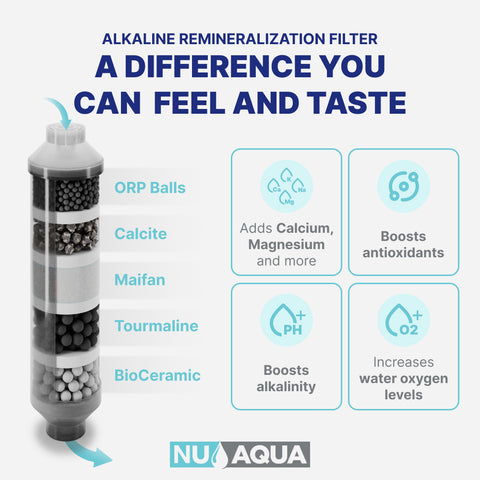Have you ever wondered if the water you drink might be doing more harm than good? With the rise of RO (Reverse Osmosis) water systems in households, there’s a growing concern about potential mineral deficiencies.
You might love the crisp, clean taste of RO water, but what if it’s stripping away essential minerals that your body needs? Imagine feeling more tired, having weaker bones, or even facing issues with your heart, all because of the water you drink every day.
This article will unravel the truth behind RO water and mineral deficiencies, helping you make informed decisions for your health and well-being. Curious to know more? Let’s dive into the world of RO water and its impact on your body.

Credit: nuaquasystems.com
Ro Water Basics
RO water is a type of purified water. It is made through a process that removes impurities. This process is known as reverse osmosis. Many people use RO water for drinking and cooking. It is also common in various industries. Understanding RO water can help you make informed choices. Let’s dive into the details.
Reverse Osmosis Process
The reverse osmosis process involves pushing water through a membrane. This membrane filters out unwanted particles. It removes contaminants like salts and heavy metals. The result is clean, pure water. This method is effective in reducing water impurities. It is widely used for water purification.
Common Uses Of Ro Water
RO water is popular in households. People use it for drinking and cooking. It is also used in aquariums to create a safe environment for fish. In laboratories, RO water is essential for experiments. Industries use it for manufacturing and cleaning processes. These diverse uses highlight its importance.

Credit: nuaquasystems.com
Minerals In Drinking Water
RO water removes minerals during filtration. This can lead to mineral deficiency in some individuals. Drinking mineral-rich water or supplementing may help maintain balanced health.
Minerals in Drinking Water Have you ever stopped to think about the minerals in your water? While it may seem like a small detail, the minerals in your drinking water play a vital role in your health. These natural nutrients can impact everything from your bone strength to your immune system.Essential Minerals For Health
Your body relies on certain minerals to function optimally. Calcium, for instance, is crucial for strong bones and teeth. Magnesium supports muscle and nerve function, while potassium helps regulate fluid balance. Do you get enough of these minerals from your water? It’s worth considering, as they contribute to your overall well-being.Natural Sources Of Minerals
While some minerals can be found in drinking water, many are also present in the foods you eat. Leafy greens, nuts, and seeds are excellent sources of magnesium. Dairy products are rich in calcium, and bananas are known for their potassium content. Have you tried diversifying your diet to ensure you’re getting a balanced intake of these essential nutrients? Sometimes, simply adding a handful of almonds to your snack routine can make a difference. Water from natural springs or wells often contains these minerals naturally. However, if you’re drinking filtered or bottled water, you might be missing out. Are you considering your water source when thinking about mineral intake? This could be a simple change that impacts your health positively.Impact Of Ro Water On Mineral Content
The impact of RO (Reverse Osmosis) water on mineral content has been a topic of discussion among health enthusiasts. RO water systems are highly effective at purifying water by removing contaminants. However, this process can also strip away essential minerals, which raises questions about potential health implications.
Mineral Reduction In Ro Water
RO systems work by pushing water through a semipermeable membrane, which filters out impurities. This process is highly efficient, removing over 90% of common contaminants like lead, chlorine, and fluoride. However, it also removes beneficial minerals such as calcium, magnesium, and potassium. This lack of minerals can be a concern for those relying solely on RO water for their hydration needs.
Think about it—if your diet isn’t rich in these minerals, relying on RO water alone might not suffice. Although the body requires only small amounts of these minerals, they play crucial roles in bone health, muscle function, and nerve signaling. So, while the purity of RO water is a plus, its mineral reduction could potentially lead to deficiencies if not addressed.
Comparing Mineral Levels: Ro Vs. Tap Water
To understand the difference, consider a simple comparison of mineral levels in RO and tap water. Tap water, depending on the source, typically contains various minerals in significant amounts. These minerals contribute to your daily intake, albeit in small quantities. RO water, on the other hand, has substantially lower levels of these minerals due to its purification process.
For instance, tap water might provide a small percentage of your daily calcium or magnesium needs. RO water, however, will contribute almost none. This difference is crucial if you’re monitoring your mineral intake for health reasons. If you rely on RO water, it might be worth considering mineral supplementation or ensuring your diet compensates for this reduction.
Have you ever thought about where you get most of your minerals from? If it’s not from your water, then your diet becomes even more important. Consider this when planning your meals, especially if RO water is your primary source of hydration.
Ultimately, while RO water offers excellent purification, it’s essential to be mindful of its impact on your mineral intake. By understanding this, you can make informed choices about your water consumption and dietary needs.
Health Implications Of Mineral Deficiency
Minerals play a vital role in maintaining good health. They support bone strength, energy production, and nerve function. Without enough minerals, the body struggles to perform these essential functions. This can lead to various health issues, impacting daily life and overall well-being.
Consuming RO water may remove essential minerals. This process can lead to mineral deficiency over time. Understanding the symptoms and long-term effects is crucial for ensuring optimal health.
Symptoms Of Mineral Deficiency
Several signs indicate a lack of minerals in the body. Fatigue is a common symptom. It occurs due to decreased energy production. Muscle cramps may also happen, signaling a deficiency. Weak bones can lead to frequent fractures. Poor immune response makes infections more likely.
Skin problems such as dryness are noticeable. Brittle nails and hair loss can indicate low mineral levels. Digestive issues, including constipation, may arise. These symptoms impact daily life and should not be ignored.
Long-term Health Concerns
Ignoring mineral deficiency can lead to severe health problems. Osteoporosis is a risk due to weak bones. This increases the likelihood of fractures. Heart health may suffer, leading to cardiovascular issues. Hormonal imbalances can affect mood and energy levels.
Mineral deficiency may impact brain function. Memory loss and confusion can become prevalent. In children, growth and development may slow down. Addressing mineral deficiency early is crucial to prevent these long-term health concerns.
Scientific Perspectives
Reverse osmosis (RO) water is popular for its purity. Some worry that it might cause mineral deficiency. These concerns stem from RO’s ability to remove impurities and minerals. Understanding the scientific perspectives is vital. It helps you make informed choices about your water consumption.
Research Studies On Ro Water
Several studies focus on RO water and mineral loss. Research shows RO water lacks calcium and magnesium. These are essential for our health. Some studies suggest this might lead to deficiencies. Yet, not all research agrees on this. Some findings indicate we get most minerals from food, not water. This adds a new dimension to the discussion.
Expert Opinions
Experts have diverse views on RO water’s impact. Nutritionists emphasize balanced diets. They believe food is the primary source of minerals. Drinking RO water alone might not lead to deficiencies. Health professionals suggest monitoring your diet. Ensure it is rich in essential nutrients. Water quality specialists see RO as a tool. It ensures safe drinking water, free from harmful substances.
Addressing Mineral Deficiency
Reverse osmosis (RO) water is popular for its purity. But it may remove essential minerals. This can cause mineral deficiency in some individuals. Addressing this deficiency is crucial for maintaining good health. Fortunately, there are ways to ensure you get enough minerals. These include supplementation strategies and dietary adjustments.
Supplementation Strategies
Supplements can help replenish lost minerals. Multivitamins often contain minerals like calcium, magnesium, and potassium. Consult a healthcare professional before starting supplements. This ensures you choose the right ones for your needs. Some prefer mineral drops for their RO water. These drops can restore essential minerals easily.
Dietary Adjustments
A balanced diet can combat mineral deficiencies. Include foods rich in essential minerals. Leafy greens, nuts, and seeds are excellent sources. Dairy products provide calcium and other minerals. Whole grains offer magnesium and iron. Eating a variety of foods ensures you meet your mineral needs.
Alternative Water Treatment Options
Considering the potential mineral deficiency from RO water, exploring alternative water treatment options is crucial. Various systems can provide essential minerals while ensuring water safety. Understanding these options can help you choose the right solution for your needs.
Mineral-rich Water Filters
Mineral-rich water filters add essential minerals back into your water. These systems enhance water taste and health benefits. They work by infusing water with calcium, magnesium, and potassium. Such filters offer a balanced approach to water purification.
Combination Treatment Systems
Combination treatment systems integrate multiple purification methods. These systems often combine filtration with mineral addition. They ensure water is both clean and mineral-rich. This approach provides a comprehensive water treatment solution.

Credit: tirtateknosys.com
Consumer Awareness
Consumer awareness is vital in understanding the effects of RO water on health. Many people rely on RO water for daily hydration. Concerns about mineral deficiency are common. Educating oneself is essential to make the right choices.
Understanding Water Labels
Water labels provide important information. They reveal the content of minerals in RO water. Reading labels helps consumers know what they are drinking. Labels often list minerals removed during filtration. This information guides consumers to supplement their diet accordingly.
Making Informed Choices
Choosing the right water source impacts health. Consumers must evaluate their nutritional needs. RO water may lack essential minerals. Alternative water sources or supplements may be necessary. Making informed choices ensures balanced mineral intake.
Frequently Asked Questions
Does Ro Water Lack Essential Minerals?
RO water removes impurities and minerals like calcium and magnesium. This process can lead to lower mineral intake. However, a balanced diet can compensate for these missing minerals. RO water is safe to drink when you maintain a nutritious diet.
Can Mineral Deficiency Occur With Ro Water?
Drinking RO water alone may contribute to mineral deficiency. It lacks essential minerals like calcium and magnesium. Consuming mineral-rich foods can help prevent deficiency. It’s important to monitor your mineral intake if relying solely on RO water.
Is Ro Water Safe For Daily Consumption?
RO water is safe for daily consumption. It effectively removes contaminants, offering clean drinking water. However, it lacks essential minerals. Complementing your diet with mineral-rich foods ensures you meet your nutritional needs.
How To Add Minerals To Ro Water?
You can add minerals to RO water using mineral drops or filters. These methods replenish essential nutrients like calcium and magnesium. This ensures balanced mineral intake while enjoying purified water.
Conclusion
RO water has its pros and cons. It purifies water, removing harmful contaminants. But it can also strip away essential minerals. This may lead to mineral deficiencies over time. Consider supplementing your diet with necessary nutrients. Eating a balanced diet can help maintain mineral levels.
It’s about balance. Drinking RO water is safe, but be mindful of your overall nutrition. Always consult a health professional for personalized advice. Stay informed and make choices that best suit your health needs. Prioritize what works for you and your family.

Hasan Al Sarker is a Reverse Osmosis Specialist. He has worked for many years to ensure safe drinking water for all. His research paper has been published in several journals, including Issue, Medium, and Slideshare. He is recognized as a water doctor among specialists though he did not attend medical college.
Besides working as a researcher of reverse osmosis technology, he is also very fancy with the kitchen and cooking. His guides are reading thousands of people every day. As a head of content, he is responsible for all the published articles at RO System Reviews.

